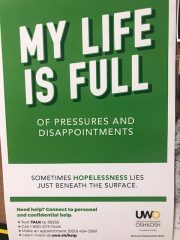The Counseling Center at the University of Wisconsin Oshkosh wants people to know that pain isn’t always obvious―that depression, loneliness, anxiety and grief may be lurking beneath the surface.
In a campaign specially focused on suicide prevention, Beneath the Surface is helping to get the word out about resources available at UWO.
“Most individuals, in different ways, hide the challenges and/or distress they are feeling at any given time,” said Sandra Cox, director of the UW Oshkosh Counseling Center. “We do it for many different reasons. Sometimes we need to do such to be able to get through the tasks of the day. Sometimes we do it to keep people more distant from us, which can often be a sign of struggling. Other times, it may be that we are feeling so overwhelmed, we don’t know how to express what we are experiencing so it is easier to hide it.”

Cox said the UWO Counseling Center sees approximately 15% of the student population. The national average on college campuses, she said, has risen from 7% to 10%.
An easy to navigate UWO webpage uwo.sh/help guides users in identifying warning signs and with loads of tips, conversation starters and information for anyone struggling or needing help for a friend.
At UWO, the focus on mental health is visible.
- Yard signs are sprinkled around campus, providing cheerful and reaffirming statements―that things are going to be OK and that being human means being imperfect.
- Coffee cup sleeve wraps subtly connect with a message that the Counseling Center located in Suite 240 of the Student Success Center, 750 Elmwood Ave., is there if help is needed.
- Posters line hallways throughout campus with intriguing statements―when taken at first glance are cheerful but upon closer look show that depression, sadness, loneliness, anxiety, emptiness, hopelessness and grief could be hiding just beneath the surface.
“I smile … so no one asks me what’s wrong.” Sometimes depression lies just beneath the surface.
“My life is full … of pressures and disappointments.” Sometimes hopelessness lies just beneath the surface.
“I am successful … at hiding how hard life can be.” Sometimes anxiety can lie just beneath the surface.

First two months
The beginning of a new school year brings all sorts of new challenges and opportunities for college students. However, for many, it also brings along increases in anxiety, depression and other difficult realities.
UWO Interim Vice Chancellor for Student Affairs and Dean of Students Art Munin said that is why it is vital for UWO to offer resources that provide support to students in need and safety nets for those who find themselves in crisis.
“I walk through campus and know there are countless hidden stories of difficulty masked behind the smiling faces of our college students,” he said. “So many of us extol an incredible amount of energy into convincing the world around us that we are perfectly fine. We are so adept at this as a society, that for those of us who struggle, we look out into a sea of smiling faces daily and feel utterly alone in our struggle. Many do not realize the pain hidden behind many of the smiles we see on campus.”
Cox said the first couple of months can be the hardest transition for many students―especially those who had a non-traditional first year college experience and have had to cope with many of the pandemic’s side effects.
UWO strives to be a community, Munin said, where people check in with each other, provide support and connect students with an array of helpful resources.
Acknowledging pain, asking for help
Pain is undoubtedly part of the experience of life. But if pain seems overwhelming and feels greater than the ability to cope with it, thoughts of suicide can take over.
Counselors note that the first step is to acknowledge pain and then connect with a supportive person or ask for help from a mental health professional. People experiencing pain should be kind to themselves and allow time to heal as new ways to lesson pain are learned.

A friend is struggling
Pain isn’t always obvious, but experts say most suicidal people show some signs that they are thinking about it― in conversations, through their actions or in social media posts. Anyone who observes one or more warning signs, especially if the behavior is new, has increased or seems related to a painful event, loss or change, needs to step in or speak up.
A key message on the Beneath the Surface webpage stresses that although talking about mental health might be uncomfortable, connecting with someone who is struggling could save their life.
The most important thing for anyone concerned about a friend, is letting them know you are there, you care and you support them.
“The main message I would like to share with students is ‘hope,’” Cox said. “There will always be moments of suffering in life, but the suffering can become less with support systems and positive coping skills in place. Hope provides us light to navigate through hard times to know that there will be an end to suffering and life will eventually be better.”
Learn more:
Need help?
Text “TALK” to 38255 (confidential crisis text line)
Text “HOPELINE” to 741741
Call (800) 273-TALK (8255)
